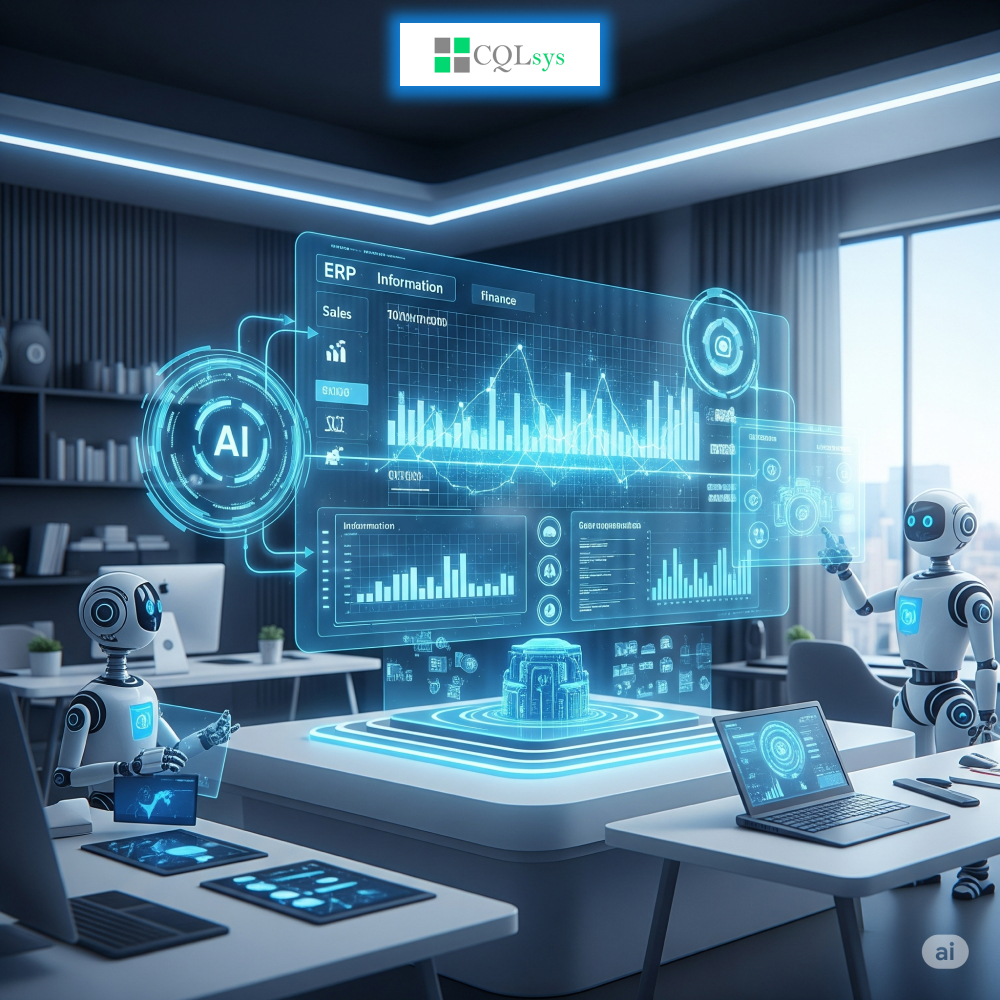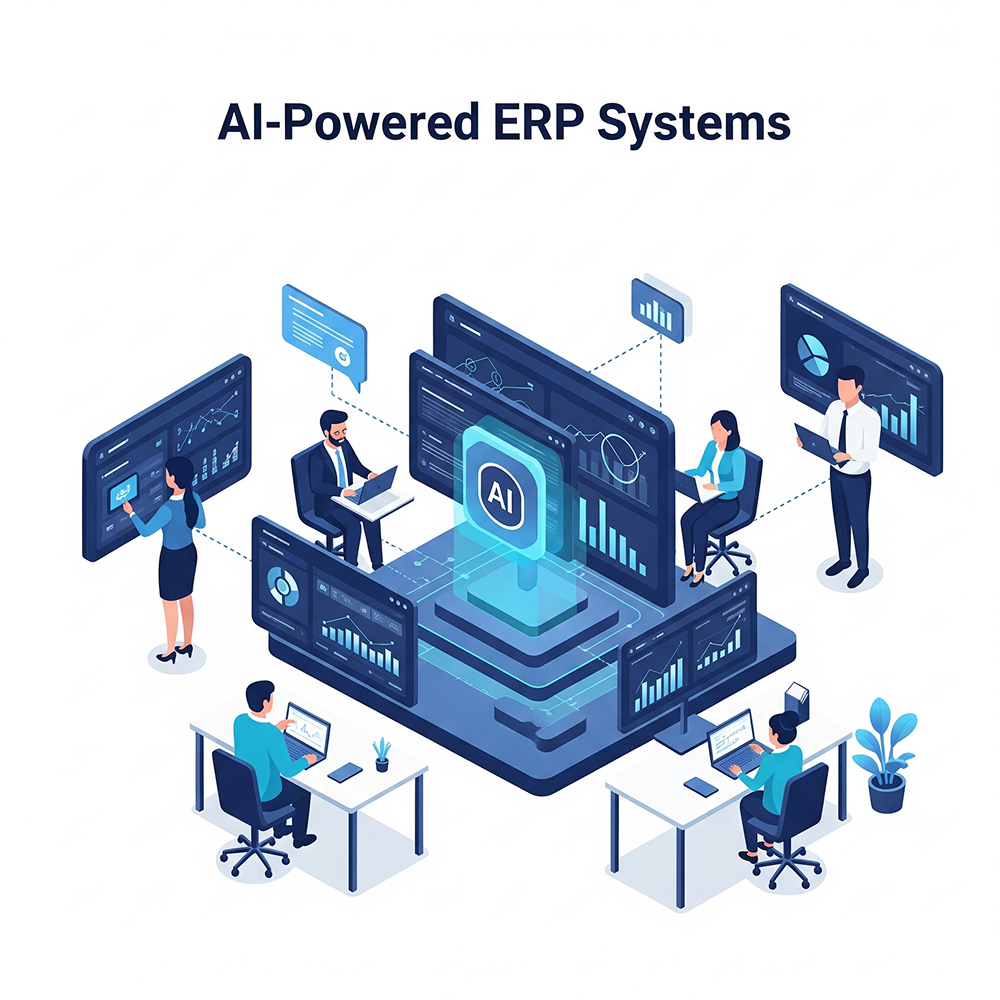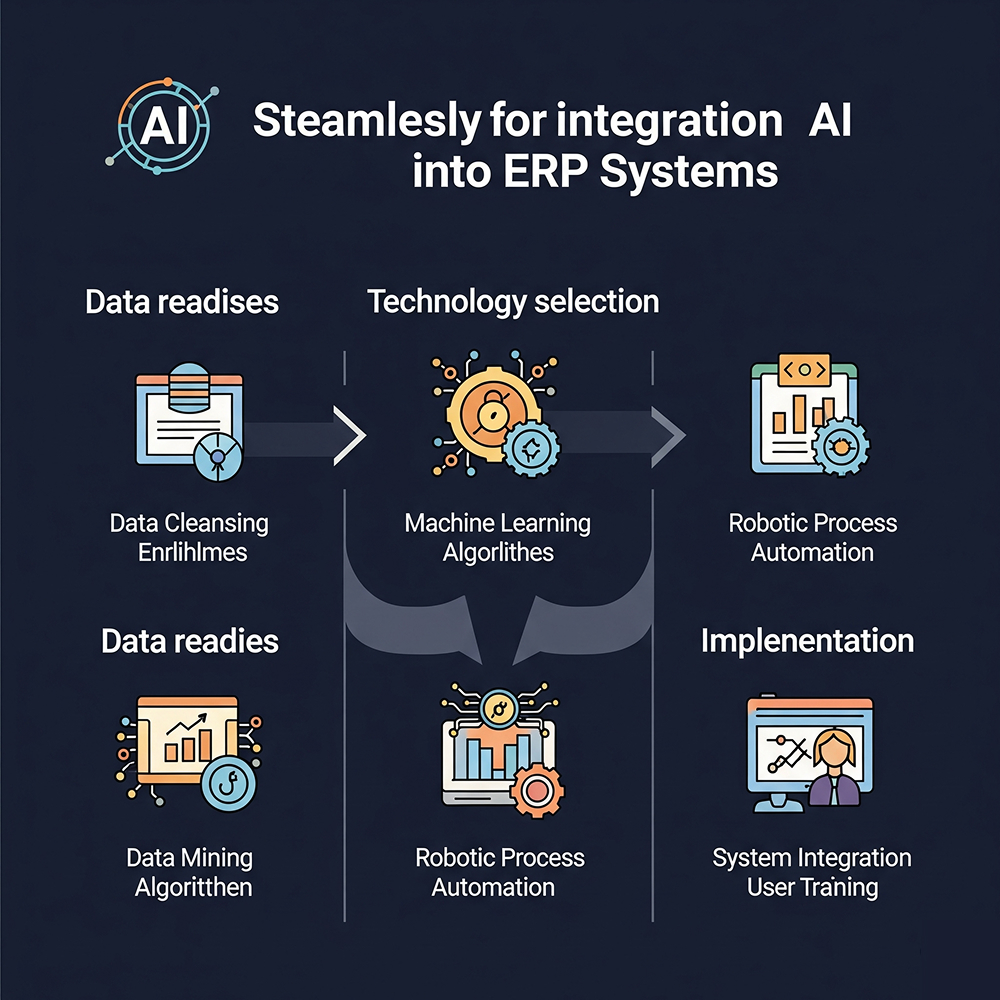The Intelligent Enterprise: How AI Integration is Revolutionizing ERP Systems in 2025

In the dynamic business landscape of 2025, the very definition of Enterprise Resource Planning (ERP) is undergoing a radical transformation. No longer are ERP systems mere data repositories or tools for automating routine tasks. Thanks to the accelerating, pervasive integration of AI into ERP systems, these platforms are evolving into proactive, intelligent powerhouses that are fundamentally reshaping how businesses operate. This isn't just an upgrade; it's a profound revolution, leading to unprecedented levels of efficiency, insight, and a formidable competitive advantage. This detailed guide explores how AI is transforming ERP systems in 2025, the benefits of integrating AI into ERP systems, the cost of ERP implementation with AI features, and a step-by-step guide to AI ERP implementation.
The AI-Powered ERP in 2025: A Paradigm Shift
For decades, traditional ERP systems served as the backbone of enterprise operations, centralizing data and automating well-defined, repetitive processes. However, their reliance on human intervention for complex analysis, strategic decision-making, and adaptive responses to market fluctuations presented inherent limitations. The advent and maturing of AI, particularly Machine Learning (ML) for pattern recognition and prediction, Natural Language Processing (NLP) for intuitive human-computer interaction, and increasingly, Generative AI for content creation and complex problem-solving, are dismantling these limitations. This marks the true future of ERP with artificial intelligence in 2025.
In 2025, an AI-driven ERP is characterized by its:
- Proactive Intelligence:Shifting from merely reporting historical data (reactive) to predicting future trends (predictive analytics) and even recommending optimal actions (prescriptive analytics). This allows businesses to anticipate challenges and opportunities, rather than merely reacting to them.
- Hyper-Automation: Beyond simple task automation, AI enables the AI-driven ERP software for enterprise automation, complex, end-to-end business processes that previously demanded significant human oversight, from intricate supply chain adjustments to multi-stage financial reconciliations.
- Enhanced User Experience (UX):AI is making ERP systems more intuitive, conversational, and accessible. Voice commands, natural language queries, and intelligent assistants streamline interactions, democratizing access to powerful data insights for a broader range of users, reducing the need for specialized technical knowledge.
- Continuous Optimization:Learning and adapting from new data continuously flows into the ERP system, the AI algorithms refine their predictions, improve automation routines, and continuously optimize business processes without constant manual reprogramming.
Unlocking the Benefits: Why AI-Powered ERP Matters Now

The advantages of infusing AI into your ERP system are profound and extend across virtually every facet ofbusiness operations, creating a truly intelligent enterprise. These are the core business benefits of AI-enhanced ERP in 2025, showcasing how it helps maximize operational efficiency with AI ERP.
-
Smarter Financial Management: From Reactive Reporting to Proactive Strategy Financial departments are experiencing a seismic shift. AI empowers ERPs to offer:
- Predictive Cash Flow and Revenue Forecasting: AI algorithms analyze not just historical financial data but also external market trends, economic indicators, seasonal variations, and even real-time news to predict cash flow and revenue with remarkable accuracy, allowing for proactive financial planning. This is a key aspect of how AI ERP improves decision-making and forecasting.
- Automated Reconciliation and Enhanced Fraud Detection: AI can automate the laborious tasks of invoice processing, payment matching, and bank reconciliation. Simultaneously, its ability to identify subtle anomalies and patterns within vast transaction data significantly strengthens fraud detection capabilities, flagging suspicious activities in real-time and minimizing financial risks.
- Proactive Financial Strategy & Compliance: CFOs gain access to AI-powered dashboards that provide real-time insights into financial health, highlighting potential risks, identifying cost-saving opportunities, and recommending optimal investment or cost-cutting measures. Furthermore, AI can automate compliance checks, ensuring adherence to evolving regulatory standards (e.g., IFRS, GAAP, local tax laws), significantly reducing audit preparation time and costs.
-
Optimized Supply Chain & Inventory: Precision and Resilience
Supply chain management becomes far more intelligent and resilient with AI. This highlights AI ERP use cases in manufacturing industry and ERP solutions with AI for logistics companies:- Intelligent Demand Forecasting:AI goes far beyond traditional forecasting methods. By incorporating a multitude of external data points – from weather patterns and social media sentiment to geopolitical events and competitor activities – AI predicts consumer demand with unparalleled precision. This minimizes costly stockouts (lost sales) and overstocking (carrying costs), leading to perfectly optimized inventory levels.
- Automated Procurement & Sourcing:ERP systems, fueled by AI, can dynamically adjust procurement plans. They can automatically identify optimal suppliers based on price, quality, delivery reliability, and even sustainability metrics. In the event of supply chain disruptions, AI can instantaneously reroute orders to alternative suppliers, ensuring business continuity.
- Predictive Maintenance for Assets: For manufacturing, logistics, and other asset-heavy industries, AI analyzes real-time sensor data from machinery and equipment within the ERP. This allows the system to predict potential equipment failures before they occur, enabling preventative maintenance, reducing unplanned downtime, extending asset lifespan, and significantly cutting maintenance costs.
-
Revolutionized HR & Talent Management: Data-Driven Workforce Strategy:
Human Resources (HR) functions transform from administrative to strategic:- Automated & Intelligent Recruitment:AI can efficiently parse thousands of resumes, identify ideal candidates based on skills, experience, and even cultural fit, and automate initial screenings and interview scheduling. This drastically reduces time-to-hire and minimizes unconscious bias in the early stages of recruitment.
- Personalized Learning & Development (L&D): By analyzing employee performance data, skill gaps, and career aspirations, AI can recommend personalized training modules and development pathways, fostering continuous growth and upskilling within the workforce.
- Proactive Talent Retention & Engagement: AI can analyze various employee engagement metrics, sentiment from internal communications, and historical attrition data to predict potential employee churn. This allows HR teams to proactively intervene with targeted support, engagement initiatives, or career development opportunities to retain valuable talent.
-
Enhanced Customer Service & CRM: Hyper-Personalization and Efficiency
Customer Relationship Management (CRM) within ERP becomes a powerful engine for satisfaction, particularly relevant for how AI ERP is changing retail business operations and best ERP with AI for eCommerce businesses:- AI Copilots & Conversational Chatbots: Integrated AI assistants and chatbots handle a significant volume of customer inquiries, providing instant, accurate responses. For complex issues, AI "copilots" assist human agents by suggesting "next best actions," retrieving relevant information, and even drafting personalized email responses, leading to faster resolution and higher customer satisfaction.
- Personalized Marketing & Sales: AI analyzes vast customer behavior data, purchase history, and demographic information to create hyper-targeted marketing campaigns, dynamic pricing models, and personalized product recommendations, significantly boosting conversion rates and customer loyalty.
- Sentiment Analysis & Proactive Support:AI can monitor customer interactions (emails, social media, call transcripts) to gauge sentiment. This allows businesses to identify dissatisfied customers early, address potential issues proactively, and prevent churn before it escalates.
-
Superior Decision Making & Business Intelligence: Real-Time Agility
The core of business strategy is fundamentally improved by AI-powered ERP:- Real-time Insights & Dynamic Dashboards: AI processes colossal datasets instantaneously, transforming raw data into actionable insights displayed on intuitive, real-time dashboards. This empowers executives and managers with immediate visibility into KPIs, enabling truly informed, agile decision-making in rapidly changing market conditions. This contributes to a massive productivity boost with AI-enabled ERP software.
- Automated Reporting & Regulatory Compliance: Leveraging Natural Language Processing (NLP) and generative AI, ERP systems can automatically generate complex financial, operational, and compliance reports. AI can continuously monitor transactions and processes to flag potential compliance issues, ensuring adherence to regulations and streamlining audit readiness with minimal manual effort.
- Scenario Planning & Optimization: AI enables advanced scenario modeling, allowing businesses to simulate the impact of various strategic decisions (e.g., market entry, pricing changes, production increases) on their operations and financials before committing resources.
The Integration Process: A Strategic Roadmap to an Intelligent ERP

Integrating AI into an existing ERP system, or implementing a new AI-native ERP, is a strategic undertaking that requires a structured, phased approach. It's not a one-time project but an ongoing evolution. This section provides a step-by-step guide to AI ERP implementation and discusses the ERP integration process with automation and AI.
-
Define Clear Objectives & Use Cases (Discovery Phase):
- Strategic Alignment:Begin by identifying critical business problems or opportunities that AI can uniquely address. What specific pain points in finance, supply chain, HR, or customer service do you want to resolve?
- Prioritization:Start with a focused Proof of Concept (PoC) or Minimum Viable Product (MVP) to demonstrate tangible value quickly. This iterative approach builds confidence and allows for learning before a full-scale rollout.
- This step is crucial for businesses figuring out how to implement AI in existing ERP systems effectively.
-
Data Readiness & Robust Governance:
- Data Cleansing and Unification: AI models are only as good as the data they consume ("garbage in, garbage out"). This crucial step involves extensive data cleansing, deduplication, standardization, and integration from disparate sources (internal ERP modules, external market data, IoT sensors). This can be a significant undertaking.
- Establish Data Governance Framework: Define clear policies for data collection, storage, security (including cybersecurity protocols relevant to current threats in 2025), privacy (e.g., GDPR, CCPA, India's DPDP Act), and access control. This ensures data integrity, compliance, and trustworthiness of AI outputs.
-
Choose the Right AI Technologies & Solutions:
- Evaluate ERP Vendor Offerings:Many leading ERP vendors (like SAP S/4HANA with AI/ML, Oracle Fusion Cloud Applications with embedded AI, Microsoft Dynamics 365 Copilot, Infor CloudSuite with Coleman AI) are increasingly embedding AI capabilities directly into their platforms. Leveraging these native functionalities can simplify integration. These are some of the top AI-powered ERP systems for business growth.
- Consider Custom vs. Off-the-Shelf: For highly unique business processes or competitive advantages, custom AI model development might be necessary, involving a data science team. For more common tasks (e.g., chatbots, fraud detection), pre-built AI modules, API-driven AI services (AI-as-a-Service, AIaaS from AWS, Azure, Google Cloud AI), or open-source frameworks can be more cost-effective and faster to deploy. This is important for AI-based ERP solutions for small businesses and larger enterprises alike.
- Infrastructure Strategy (Cloud/Hybrid/On-Premise):Decide whether to leverage cloud-based AI platforms for their scalability, flexibility, and reduced infrastructure overhead, or maintain greater control with on-premise or hybrid solutions, especially for sensitive data or specific regulatory requirements. This impacts setting up ERP software with AI in 2025.
-
Develop, Train, and Rigorously Test AI Models:
- Model Development:This core technical phase involves data scientists and AI engineers who design, build, and configure the AI algorithms.
- Training & Validation:AI models are trained on your meticulously prepared historical and real-time data to learn patterns, identify anomalies, and make predictions. This requires significant computational resources.
- Thorough Testing: Rigorous testing and validation are paramount to ensure the AI's accuracy, reliability, and fairness. This includes testing against various scenarios, edge cases, and continuous monitoring for drift or bias.
-
Seamless Integration with Core ERP Modules:
- API-Driven Integration:AI models must be seamlessly integrated into relevant ERP modules (Finance, Supply Chain, Manufacturing, HR, CRM, etc.) using robust APIs (Application Programming Interfaces) or direct system connectors.
- Data Flow Optimization: Ensure that data flows smoothly and securely between the AI layer and the core ERP, enabling real-time processing and bidirectional feedback. This answers how to upgrade traditional ERP to smart ERP.
-
User Training & Proactive Change Management:
- Upskilling the Workforce:AI-powered ERP fundamentally alters workflows and decision-making processes. Comprehensive training for employees at all levels is crucial to ensure adoption, build trust in AI outputs, and maximize the benefits. This includes training on new interfaces, AI-assisted decision-making, and understanding AI-generated insights.
- Strategic Change Management: Implement robust change management strategies to address potential resistance, alleviate concerns about job displacement (by re-emphasizing human-AI collaboration), and foster a pervasive culture of AI adoption and innovation. These are best practices for AI ERP implementation in 2025.
-
Continuous Monitoring, Iteration, & Optimization:
- AI Models are Dynamic:AI models are not static. They require continuous monitoring for performance degradation, regular retraining with fresh data, and periodic updates to maintain accuracy and relevance.
- Retraining & Refinement:Establish regular feedback loops. As new data becomes available or business objectives shift, AI models must be retrained and refined to maintain peak performance and avoid model decay. This ensures the ERP system remains intelligent and adaptive.
The Cost of Revolution: Investment Considerations in 2025

The cost of ERP implementation with AI features can vary significantly, ranging from thousands to millions of dollars, depending heavily on the scope, complexity, and strategic approach. Understanding the ERP integration cost breakdown for 2025 is vital.
-
Data Acquisition, Preparation & Governance:
- Data Quality & Volume:This is often the most underestimated cost. If your existing data is messy, incomplete, or siloed, extensive data cleansing, structuring, and integration will be required, potentially costing anywhere from $10,000 to $100,000+ for complex, large datasets.
- Storage & Management:Storing and managing the vast amounts of data needed to train and run AI models incurs costs, particularly for cloud storage and robust data governance tools.
-
Infrastructure & Computational Resources:
-
Cloud vs. On-Premise:Cloud-based AI platforms offer scalable, pay-as-you-go models, reducing upfront hardware costs but incurring ongoing operational
expenses based on usage (e.g., for specialized GPUs/TPUs). On-premise solutions require significant upfront investment in high-performance computing hardware
(potentially $100,000 to $1M+ for enterprise-grade servers) and ongoing maintenance.
- Scalability Requirements: As your AI usage and data volume grow, so will the computational demands and associated costs.
-
Cloud vs. On-Premise:Cloud-based AI platforms offer scalable, pay-as-you-go models, reducing upfront hardware costs but incurring ongoing operational
expenses based on usage (e.g., for specialized GPUs/TPUs). On-premise solutions require significant upfront investment in high-performance computing hardware
(potentially $100,000 to $1M+ for enterprise-grade servers) and ongoing maintenance.
-
Talent Acquisition & Development:
- Specialized Expertise:This is arguably the most expensive and critical component. Hiring AI researchers, machine learning engineers, and data scientists commands high salaries due to demand. In major tech hubs, annual salaries can range from $150,000 to $350,000+ per individual annually.
- Upskilling Existing Workforce:Training your current IT and business teams to effectively use, monitor, and troubleshoot AI-powered ERP features is an ongoing cost.
- Outsourcing vs. In-house:Leveraging IT outsourcing companies or specialized AI consultancies can mitigate some talent acquisition costs, particularly for smaller projects or specific skill gaps, but may reduce direct control over the development process. Costs for external consultants can range from $50-$200+ per hour.
-
Software & Licensing:
- ERP Vendor Licenses:Many modern ERP suites include embedded AI capabilities, but advanced features, higher usage tiers, or specific AI modules may require premium licenses or additional subscriptions.
- Third-Party AI Tools & APIs:Costs for specialized AI platforms, pre-trained models, or APIs from third-party providers can add up, ranging from thousands to tens of thousands per month depending on usage.
-
Integration & Customization:
- Complexity of Integration: Integrating AI with legacy ERP systems or highly customized existing environments can be complex and costly, requiring significant development effort and potentially middleware solutions.
- Custom Model Development:If off-the-shelf AI solutions don't meet unique business needs, developing custom AI models requires more development hours and specialized expertise, directly impacting costs.
-
Maintenance & Ongoing Optimization:
- Continuous Monitoring & Retraining: AI models are not static. They require continuous monitoring for performance degradation, regular retraining with fresh data, and periodic updates to maintain accuracy and relevance. This is an ongoing operational cost.
- Security & Compliance Updates: Ensuring the AI layer remains secure and compliant with evolving data privacy and industry-specific regulations is a continuous investment. This contributes to the total cost of ownership for smart ERP systems.
Typical Cost Ranges (highly generalized for 2025): This provides an answer to how much does an AI-powered ERP system cost.
- Small-scale AI automation (e.g., a simple chatbot, automated data entry for one specific module, basic anomaly detection): $15,000 - $75,000+. This includes affordable AI ERP solutions for startups.
- Medium-scale AI integration (e.g., predictive analytics for a specific supply chain segment, intelligent financial forecasting for a department, advanced HR recruitment automation): $75,000 - $750,000+.
- Large-scale, enterprise-wide AI-powered ERP transformation (integrating AI across multiple core business functions, custom AI model development, extensive data migration and governance): $750,000 to several million dollars.
While the initial investment can be substantial, the ROI of using AI in ERP systems often far outweighs the costs. The gains come from vastly increased operational efficiency, reduced errors, optimized resource allocation, superior decision-making, and enhanced customer satisfaction, all contributing to a stronger competitive position. This is the essence of an ERP budgeting guide for AI integration.
Industry Use Cases: AI-Powered ERP in Action
The versatility of AI in ERP extends across various sectors:
- Manufacturing Industry: AI ERP use cases in the manufacturing industry include predictive maintenance on machinery, intelligent quality control (using computer vision), optimized production scheduling, and precise demand forecasting for raw materials.
- Logistics Companies: ERP solutions with AI for logistics companies enable dynamic route optimization, real-time fleet management, predictive insights for delivery delays, and automated customs documentation, enhancing overall supply chain efficiency.
- Retail Businesses: How AI ERP is changing retail business operations involves personalized customer experiences, AI-driven inventory replenishment, dynamic pricing strategies, and predictive analytics for sales trends and customer behavior.
- Healthcare Industry: ERP software with AI for the healthcare industry can optimize resource allocation (beds, staff), manage complex supply chains for medical supplies, provide predictive insights for patient flow, and automate billing and compliance procedures, improving operational efficiency and patient care.
- E-commerce Businesses: The best ERP with AI for eCommerce businesses features AI-driven inventory management, personalized customer recommendations, fraud detection in online transactions, and automated order fulfillment, leading to seamless operations and enhanced customer satisfaction.
Conclusion: The Intelligent Future of Business is Here
In 2025, AI is no longer a peripheral add-on but a core, inseparable component deeply embedded within ERP systems. This integration is not merely about automation; it's about making ERPs truly intelligent, adaptive, and profoundly transformative. Businesses that strategically embrace AI in their ERP landscape will gain a significant competitive edge, driving unparalleled efficiency, fostering agility, and unlocking insights that were previously unimaginable. The future of ERP with artificial intelligence in 2025 is now. Organizations that fail to adopt this paradigm shift risk being left behind in an increasingly competitive and data-driven global economy.
